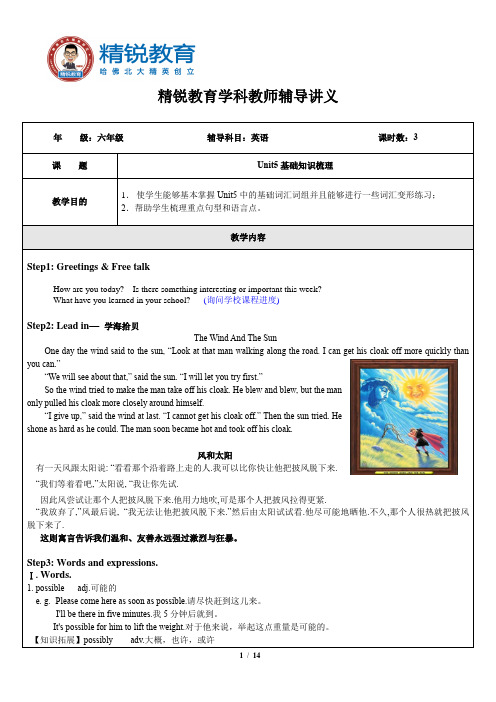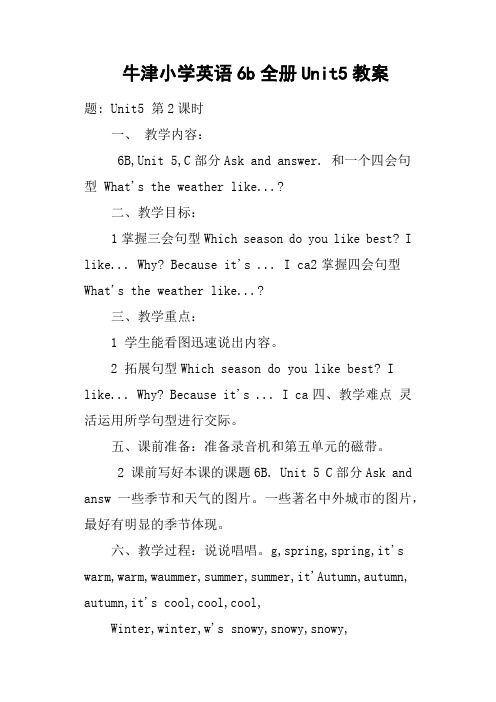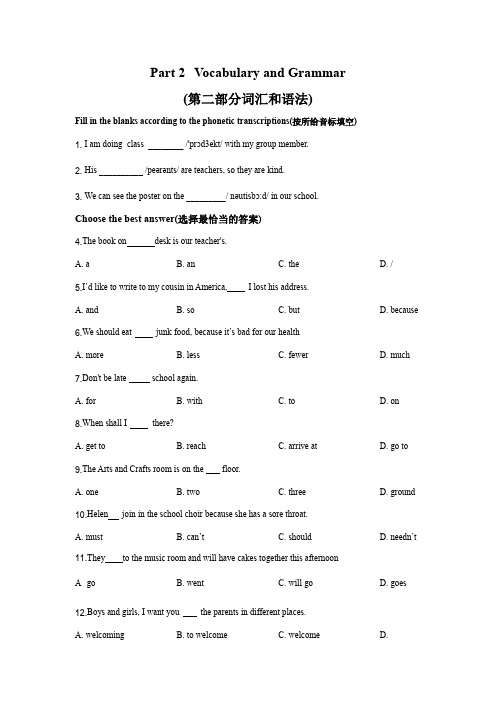牛津英语6B unit5 BC
- 格式:doc
- 大小:29.00 KB
- 文档页数:2

Unit1 谁比较年轻?在周日早晨,苏海在公园里散步。
她遇见了本和他的堂弟杰克。
她超级高兴见到他们。
他们坐在大树下聊天。
本:杰克,这是苏海。
她是我的同窗。
苏海,这是我的堂弟杰克。
苏海:很高兴见到你,杰克。
杰克:你好,苏海。
本:苏海有一个双胞胎姐妹。
她的名字叫苏阳。
杰克:真的吗?你们看上去一样吗,苏海?苏海:是的,咱们看上去一样。
杰克:你和你的双胞胎姐妹一样高吗?苏海:不,我比苏阳高。
杰克:谁比较年轻,你仍是苏阳?苏海:苏海比我年轻20分钟!杰克:太有趣了。
我想要某一天见到她。
苏海:你有一些兄弟或姐妹吗,杰克?杰克:不,我没有。
苏海:所以你是你家里的独生子。
杰克:是的,可是我的妈妈说吉米也是她的孩子。
苏海:谁是吉米?本:那是杰克的狗,他在这儿。
苏海:他是谁?杰克:他4岁了。
他比我小一岁。
苏海:哦,我明白了。
所以你有一个弟弟。
Unit2 更多锻炼吉姆擅长英语和数学,可是他不擅长体育。
他想要做得好一些可是不知道如何做。
他正在和他的父亲讨论关于它的事情。
吉姆:爸爸,我不高兴。
爸爸:怎么了?你做作业需要帮忙吗?吉姆:不。
我不擅长体育。
本跑得比我快。
他很强壮。
麦克和本跑得一样快,而且他也是一名优秀的足球运动员。
爸爸:可是我以为你跳得超级高。
吉姆:那是固然。
我比我班级里面的一些男孩跳的高。
爸爸:而且你游泳游得快。
吉姆:是的,可是我的朋友们比我游得快。
爸爸:别担忧。
多做些运动。
你会变得更强壮,而且你将更擅长体育。
吉姆:是的,爸爸。
天天我将起得更早而且在上学之前做些运动。
爸爸:真是一个好主意。
吉姆:我会在早晨慢跑去学校而且在下学后玩球类游戏。
不就我将会变得更强壮。
Unit3 问路史密斯先生来自澳大利亚,他此刻住在南京,他想去参观历史博物馆,可是他不知道路,他在问杨玲怎么去那。
史密斯先生:打搅一下,请问你能告知我去历史博物馆的路吗?杨玲:让我看看,额,沿着这条街,在第三个路口右转,博物馆就在你的左侧,你不会错过的。

精锐教育学科教师辅导讲义年级:六年级辅导科目:英语课时数:3课题Unit5基础知识梳理教学目的1.使学生能够基本掌握Unit5中的基础词汇词组并且能够进行一些词汇变形练习;2.帮助学生梳理重点句型和语言点。
教学内容Step1: Greetings & Free talkHow are you today? Is there something interesting or important this week?What have you learned in your school? (询问学校课程进度)Step2: Lead in—学海拾贝The Wind And The SunOne day the wind said to the sun, “Look at that man walking along the road. I can get his cloak off more quickly than you can.”“We will see about that,” said the sun. “I will let you try first.”So the wind tried to make the man take off his cloak. He blew and blew, but the manonly pulled his cloak more closely around himself.“I give up,” said the wind at last. “I cannot get his cloak off.” Then the sun tried. Heshone as hard as he could. The man soon became hot and took off his cloak.风和太阳有一天风跟太阳说: “看看那个沿着路上走的人.我可以比你快让他把披风脱下来.“我们等着看吧,”太阳说, “我让你先试.因此风尝试让那个人把披风脱下来.他用力地吹,可是那个人把披风拉得更紧.“我放弃了,”风最后说, “我无法让他把披风脱下来.”然后由太阳试试看.他尽可能地晒他.不久,那个人很热就把披风脱下来了.这则寓言告诉我们温和、友善永远强过激烈与狂暴。

(完整版)上海版牛津英语六年级下册6B重点知识点复习整理(最新整理)上海版牛津英语六年级下册6B重点知识点复习整理Module 1 City LifeUnit 1 Great cities in Asia【知识点梳理】1.方位词:east / west / north / south / north-east / north-west / south-east / south-west用法:a. 两地不相邻: e.g. A is north B. (= to the south of)b. 两地接壤: e.g. A is on the north of B.c. 所属关系,A包含B, B属于A: e.g. B is in the north of A.2. by + 交通工具表示“乘……交通工具”, 用how进行提问e.g. by bus / ferry / train / ship / underground… by plane = by air, by ship = by sea3. How far…多远(询问距离的远近,路程的长短)e.g. Hoe far is it from your home to school? 从你家到学校有多远?4. How long…多长,多久(询问时间的长短,提问一段时间)e.g. How long does it take to travel from Shanghai to Beijing by train? 坐火车从上海到北京要花多长时间?5. It takes (sb.) some time to do sth. 做某事需要花费多少时间e.g. It takes me five hours to make this modal plane. 做这个模型飞机花了我5个小时。
6. like / love / enjoy doing sth. 喜欢做某事e.g. The people in Bangkok like / love / enjoy eating spicy food. 曼谷人喜欢吃辛辣食物。

牛津小学英语6b全册Unit5教案题: Unit5 第2课时一、教学内容:6B,Unit 5,C部分Ask and answer. 和一个四会句型 What's the weather like...?二、教学目标:1掌握三会句型Which season do you like best? I like... Why? Because it's ... I ca2掌握四会句型What's the weather like...?三、教学重点:1 学生能看图迅速说出内容。
2 拓展句型Which season do you like best? I like... Why? Because it's ... I ca四、教学难点灵活运用所学句型进行交际。
五、课前准备:准备录音机和第五单元的磁带。
2 课前写好本课的课题6B. Unit 5 C部分Ask and answ一些季节和天气的图片。
一些著名中外城市的图片,最好有明显的季节体现。
六、教学过程:说说唱唱。
g,spring,spring,it's warm,warm,waummer,summer,summer,it'Autumn,autumn, autumn,it's cool,cool,cool,Winter,winter,w's snowy,snowy,snowy,Windy,windy,windy,it'sBeijing,windFoggy,foggy,foggy,it'sLondon,foggunny,sunny,sunny,it's Lasha,su2. Free talk. TWEATHERT: What's the weather lg in Lan Yungang? S: It's wa让学生自由谈论一些城市的气候。
Look and say.以小组为单位选一幅图谈论。

牛津小学英语6B Unit 5 The Seasons 教学设计牛津小学英语6BUnit 5 The Seasons教学内容:1 能听懂、会说、会读和会拼写单词weather ,spring ,summer, autumn ,winter2 能听懂、会说、和会读单词season ,because ,rainy ,sunny ,snowy , cloudy ,foggy , snowball fights ,3能听懂、会说、和会读日常交际用语Which season do you like best ? I like …best Why ? Because …I can …4 能听懂、会说、会读和会拼写句型What do you usually do in …? I uauslly …教学重点: 四个表示季节的单词和weather, 以及日常用语Which season do you like best ? I like …best Why ? Because …I can …教学对象分析:本节课学习的是与气候与季节相关的名词及形容词,容量和难度都比较大,六年级的学生虽然英语有一定基础,但是不容易掌握这些词, 教师要利用多种形式激发学生的兴趣,所以我在这个课件中最大限度的采用了学生容易接受的卡通画, 让学生能够积极参与语言活动, 我还设计了一首与课文相关的音乐flash,让学生能够在歌唱中进一步巩固所学知识.教学流程:A Revision(出示课件封面)Free talk ( 与学生日常交流) What day is it today ? What’s the daty today ? What did you do yesterday afternoon ? 等等T : What’s the weather like today ? Is it cold ?S : No .T : Why ?帮助学生回答Because spring is coming .It’s warm . 引出下面的学习内容B Learn the seasons1 点击课件封面的“learn the seasons”, 带学生学习季节2 T : Boys and girls ,look at the pictures ,which season is it ?让学生通过看图上的活动和景色了解到It’s spring .教师读单词spring, 学生听发音3 教师联系以前学过的知识问几个学生: What do you usually do in spring ?4 点击单词spring, 学习What do you usually do in spring ? 部分并用所给图片进行句型练习5 回到spring页面学习句型Which season do you like best ?I like …best Why ? Because …I can …这部分主要是通过不断的复现语言知识,从而把相应的知识渗透给学生, 为下一课时做好准备,所以本节课上不安排重点练习.6 点击next , 分别进入summer, autumn和winter的学习以及相关句型的练习,C sing a song学习完四季及句型后,点击sing a song , 让学生能够在歌唱中进一步巩固所学知识.D learn the weathe点击learn the weather ,初步学习有关的天气, 只要会读会说,为新课时作好渗透教学.E 阅读与调查点击learn the more ,进入阅读与调查部分.上半部分是阅读,让学生了解其它城市的天气, 下半部分是调查,让学生填写家乡的四季的特点.F 知识扩展点击knowledge , 让学生自由学习,丰富课外知识。

Part 2 Vocabulary and Grammar(第二部分词汇和语法)Fill in the blanks according to the phonetic transcriptions(按所给音标填空)1. I am doing class ________/'prɔd3ekt/ with my group member.2. His __________/peәrәnts/ are teachers, so they are kind.3. We can see the poster on the _________/ nәutisbɔ:d/ in our school.Choose the best answer(选择最恰当的答案)4.The book on desk is our teacher's.A. aB. anC. theD. /5.I’d like to write to my cousin in America, I lost his address.A. andB. soC. butD. because6.We should eat junk food, because it’s bad for our healthA. moreB. lessC. fewerD. much7.Don't be late school again. .A. forB. withC. toD. on8.When shall I there?A. get toB. reachC. arrive atD. go to9.The Arts and Crafts room is on the floor.A. oneB. twoC. threeD. ground10.Helen join in the school choir because she has a sore throat.A. mustB. can’tC. shouldD. needn’t11.They to the music room and will have cakes together this afternoonA go B. went C. will go D. goes12.Boys and girls, I want you the parents in different places.A. welcomingB. to welcomeC. welcomeD.welcomed13.I to the countryside to visit my grandparents last Sunday.A. wentB. goC. goingD. will go14.Which one is right to express 2: 15?A. quarter past twoB. fifteen to twoC. a quarter past twoD.two past fifteen15.—What about to Ocean Park?—That sounds a good idea.A. have a tripB. to have a tripC. had a tripD.having a tripComplete the following passage with the words or expressions in the box. Each canonly be used once( 将下列单词或短语前的字母填入空格,每个单词或短语只能填一次).Last Friday was our school Open Day. It was a very ___16___day for our teachers and our parents. My teacher had ___17___the invitation cards to the parents. And she asked usto___18___them at the gate of our school.___19___, they went to see our classroom.Then, our teacher held meeting with them. They talked a lot ___20___the students’ studies. Finally, the parents had lunch in our school canteen. I think Open Day is a good time for parents and the school to___21___each other well.Complete the sentences with the given words in their proper forms(用括号中所给单词的适当形式完成下列句子)22. It will be the _____ (one) time for Brazil to host the Olympic Games in 2016.23I'll meet you at the _______ ( enter) of the supermarket.24. Miss Wang is going to teach ______ (we) English next tem.25. The students in Grade Six will have a ________ ( meet) in the hall this afternoon.26. Nowadays we can enjoy ____ (photo)of different places.27. ________ (final), they won the football match.。
牛津英语6B 《Unit5 The seasons》教学_6b unit5教学英语(English)是印欧语系-日耳曼语族下的语言,由26个字母组成,英文字母渊源于拉丁字母,拉丁字母渊源于希腊字母,而希腊字母则是由腓尼基字母演变而来的。
今天小编给大家带来牛津英语6B 《Unit5 The seasons》教学_6b unit5教学,希望可以帮助到大家。
6B Unit5 The seasons四会单词:season 季;季节 next 紧接在后的,接下去的weather 天气 summer 夏季autumn 秋季 best 最好的;最;最好地spring 春季 winter 冬季四会句型:Which season do you like best? 你最喜欢哪个季节?I like ... best. 我最喜欢 ......Why? 为什么?Because it’s ... I can ... 因为天气 ......我能 ......重点短语:1.go to New York 去纽约2.next week 下周(last week 上周)3.work there for one year 在那里工作一年4.as hot as ... 和 ......一样热5.the best season 最好的季节6.go to farms 去农场7.in the countryside 在乡下8.pick apples 摘苹果9.most of the time 大部分时间10.make snowmen 堆雪人11.need some warm clothes 需要一些暖和的衣服12.need to buy some warm clothes 需要买一些暖和的衣服13.a lot of rain 许多雨14.turn green 变绿15.go swimming/walking/jogging 去游泳/散步/慢跑16.go rowing and fishing 去划船,钓鱼17.get longer变得更长18.get shorter变得更短19.lots of snow 许多雪20.stay at home 呆在家里21.wait for spring 等待春天22.in spring/summer/autumn/winter 在春季/夏季/秋季/冬季重点句型:1.What about/How about ...? ......怎么样?2.What’s the weather like ...? ......的天气怎么样?3.---What do you usually do? 你通常做什么?---I usually ... 我通常......4.Sounds great! 听起来很棒!知识点:1.in + 季节名称in spring/summer/autumn/winter2.Which season do you like best?I like ... best. 最喜欢Which season do you like better, spring or autumn?I like ... better. 更喜欢3.注意词性的变化:区分名词、动词和形容词名词:rain雨 wind风 snow雪 sun太阳 cloud云动词:rain下雨 snow下雪形容词:rainy下雨的;多雨的 windy有风的;多风的snowy下雪的;多雪的 sunny晴朗的cloudy多云的There is a lot of rain in spring. (不可数名词)It often rains. (动词的第三人称单数形式)It’s raining now. (动词的ing形式)It’s often rainy. (形容词)4.It’s as hot as in Nanjing.It’s colder than in Nanjing.(句中的in不能少)5.一般将来时的构成:a.be going to +名词/动词原形b.will/shall+动词原形(shall用于第一人称)6.what about/how about的后面可以加名词、宾格或动词的ing 形式。
六年级第二学期牛津英语知识点梳理Unit One Great cities in Asia打*的知识点仅供参考知识点梳理:I 词组1. at an exhibition 在展览会上2. the capital of China 中国的首都3. north-east of Shanghai 在上海东北面east/ west/ south / north of 在……的东、西、南、北面north-east /north-west of 在……的东北、西北south-east /south- west of 在……东南,西南* in/on/to the east ofeg. Shanghai is in the east of China.Korea is on the east of China.Japan is to the east of China.3. how far 多远4. how 如何/怎样5. how long 多久6. in the past 在过去7. other places 其他城市8. from shanghai to Beijing 从上海到北京9. read some information about Beijing 阅读关于北京的信息10. the Great Wall 长城* the Summer Palace 颐和园* the Palace Museum 故宫博物院11. more than= over 超过* less than = under 少于12. 15 million people 一千五百万人*millions of, thousands of13. huge department store 大型百货公司*huge= very big14. spicy food 辣的食物15. in Asia 在亚洲16. great cities= big cities 大城市17. which city 哪个城市18. by plane=by air; 乘飞机by ship=by sea; 乘船by train/ ferry 乘火车/ 渡轮19. That’s right. 对的。
牛津小学英语6B Unit5 The seasons第一教时1、教学内容:《牛津小学英语》6B Unit5第一教时2、教材简析:本单元主要围绕“季节及气候”这个话题展开各项活动,所涉及的日常交际项目有介绍、询问、建议等。
其中以“询问天气”及应答为重点内容。
同时学习常用的与气象相关的一些词汇,在设计教学活动时,应用“任务型”教学方法,以活动来支撑课堂。
学生在一、二单元已学习过形容词和副词的比较级,因此能理解文中天气的比较.本节课重点是培养学生整体理解语篇的能力。
3、教学目标:(一)知识目标1. 掌握单词、词组season, weather, summer, autumn, best, spring,winter, cool, windy, countryside, snowman2. 能听懂、会说、会读日常交际用语What’s the weather like?It’s … Does it often rain there in spring? Yes, it does. Which season doyou like best? I like … best? I like … best. Why? Because it’s … I can …(二)技能目标1. 理解并初步朗读课文,提高学生整体理解语篇的能力。
2. 能初步运用所学句型谈论天气情况。
3. 了解纽约的气候,拓展学生的文化视野。
(3)情感态度目标(1)引导学生关注自己生活的地方的天气情况,进而加深对家乡的了解。
(2)采用“任务型”教学途径,激发学生的学习兴趣。
四、重点难点:初步了解掌握句型:Which season do you like best? I like…Why? Because it’s …I can…What’s the weather like …?It's...五、设计理念:基于新课标提出的“加强学习内容和学生生活的联系,关注学生学习兴趣和经验”,本节课我将采用“对话式”教学法和“任务型”教学法,激发学生的学习兴趣。
Unit 5 The seasons (BC)
Teaching aims:
1.能听懂,会说,会读,会拼写:
四季名称:spring, summer, autumn, winter,
天气状况:warm, cool, sunny, cloudy, rainy, windy
2. 掌握句型:
A: Which season do you like best ? B: I like....
A: Why? B: Because it’s ... I ca n... Teaching procedure:
Writing the title: Unit 5 The seasons (BC)
Showing the learning aims:
1. 能听懂,会说,会读,会拼写:
四季名称:spring, summer, autumn, winter,
天气状况:warm, cool, sunny, cloudy, rainy, windy
2. 掌握句型:
A: Which season do you like best ? B: I like....
A: Why? B: Because it’s ... I can... The first teaching-and-learning
Learn Part B Look, read and learn
Guide One
Look at the picture and read the words by yourself. ( 4minutes)
圈出你不会读的单词,等会儿认真听录音。
Guide two
1.Read the words after the tape twice.
2.Read the words by yourselves.(5minutes)(比一比谁记的最快)
3. Ask some students to read Part B.(不会读的采用兵教兵的方法) The second teaching-and-learning
Learn Part C Ask and answer
Guide one
1.Look at the pictures and talk about them (5’)
同桌之间互相讨论句型,采用一问一答的方式。
2. The teacher make a model with a student.
3. Ask students to make the sentences with their partners (5’)
比一比哪一组能准确,流利地说出对话。
Guide two
Check the answers.
Practice in class
做《伴你学》BC。